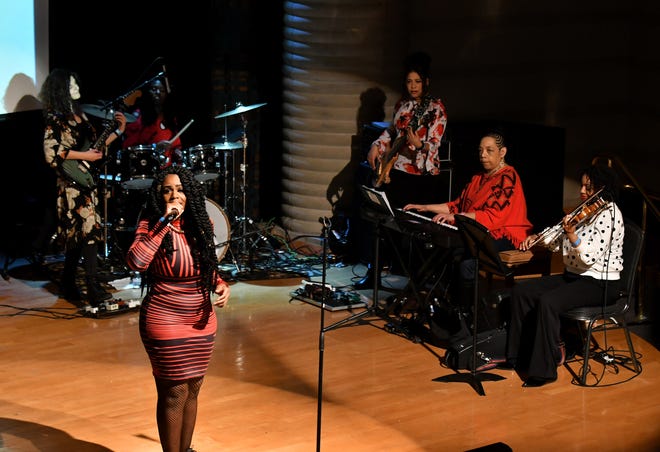Detroit hip-hop events, forum offer safe space for female listeners
 James David Dickson
James David Dickson
Detroit — Seats were difficult to find Sunday at a forum on women in hip hop.
The event, "Culture as Capital: How we use hip hop to reclaim representations of women in media," highlighted the contributions of women to the art form.
Piper Carter, 47, whose group We Found Hip Hop put on Sunday's event, returned to Detroit from New York in 2008. In hip-hop's birthplace, women were regular contributors and fans of the genre.
Detroit was a bit different. "I was wondering: where'd (the women) go? Where are they hiding?" said Carter.
"A lot of the hip hop places were full of dudes," Carter said. "That's a lot of testosterone. Mix that with dark environments and drinking, and it's kind of a dangerous place ... Guys were grabbing women's behinds and their breasts, grabbing between their legs. I thought that was a dangerous, terrible, violent environment."
She decided to do something about it, starting with weekly events on Tuesday nights.
These hip-hop events had several rules, but two major ones: No misogyny and no patriarchal references in the lyrics.
"It took a while," Carter said. "But eventually we started changing the culture."
The goal became more than just an appreciation of hip hop and women's role in it. It became the creation of a safe space for hip-hop listeners of all ages.
"Because we were running all-ages events that were safe for women, they were safe for everyone," Carter said. "A lot of women have kids. Some would bring theirs. And it became a place for young folks."
Oakland University professors Kellie Hay and Rebekah Farrugia started going to Carter's events in 2012.
One of the participants at their first event was on stage was "speaking in language we prefer not hear," Hay recalled.
The DJ not only turned off the music, but also told the young man "that doesn't happen here."
"Whoa," Hay thought. "Someone got checked at a hip-hop club?"
Now they're in the "final revisions" of a book on the movement, “Women Rapping Revolution: Hip hop and community building in 21st century Detroit.” Carter is writing the foreword. Publication is forthcoming.
"It took a year for us to be invited in — and it should have. But we kept going back. We really stood out at Old Miami," Hay said, referring to a bar and music venue on Cass in Detroit.
Farrugia said the pair would have "embarrassed themselves" if they'd published the book even three or four years ago. Instead, those years of study and connecting with artists led the women to consider the larger context in which their music was being made, including "a forced bankruptcy, water shutoffs and gentrification," Hay said.
Sunday's event at the General Motors Theater at the Charles H. Wright African-American History Museum in Detroit started with an extended look at Carter's documentary, "Detroit women in Hip Hop." She's been working on it since 2009 and still has two years' more worth of work, she said. Funding has to be secured for use of the music used, and there are more interviews to be done.
Carter praised the pair for studying the subject "without being colonizers." Hay said that line is crossed when an outsider attempts to "speak for people, or define them."
Farrugia thanked the women they've met who've "checked" both the women and their work over the years. Whatever royalties the book generates will go to We Found Hip Hop, the authors said.
The professors are realistic about the book's sales prospects — works from academic presses aren't intended for popular audiences.
Carter has a bigger vision.
"We're going on tour," she said.
After the panel, an all-female band was scheduled to play, and the event would end with 15 minutes of open-mic time, a hallmark of Carter's events since her return to Detroit in 2008.
Carter said if the hundreds of guests Sunday take away one message, it's that "these women in Detroit are great musicians and artists, and you can hire them and pay them a fair, livable wage. You can pay their rate — not cheaper because they're women."